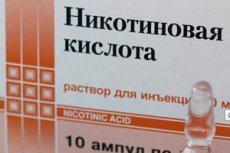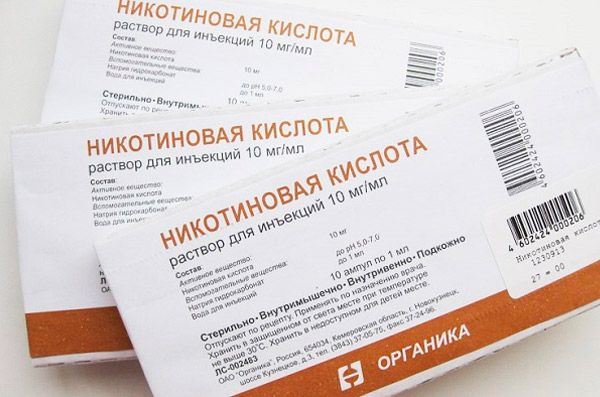Medical expert of the article
New publications
Preparations
Nicotinic acid for weight loss
Last reviewed: 03.07.2025

All iLive content is medically reviewed or fact checked to ensure as much factual accuracy as possible.
We have strict sourcing guidelines and only link to reputable media sites, academic research institutions and, whenever possible, medically peer reviewed studies. Note that the numbers in parentheses ([1], [2], etc.) are clickable links to these studies.
If you feel that any of our content is inaccurate, out-of-date, or otherwise questionable, please select it and press Ctrl + Enter.

Despite the fact that the name nicotinic acid is associated with cigarettes by most people, it has nothing to do with them.
Common names for nicotinic acid:
- niacin;
- vitamin PP;
- Vitamin B3.
The Latin name of the substance is Acidum nicotinicum. The chemical name is 3-Pyridinecarboxylic acid. The formula is C6H5NO3.
Nicotinic acid, according to medical classification, is a low-molecular organic compound (vitamin), necessary for the human body no less than vitamin C, tocopherol, retinol, cyanocobalamin, etc. Niacin affects the stability of the functions of the central and autonomic nervous systems. Activates the work of the hematopoietic system, gastrointestinal tract, helps stabilize hormonal levels.
Nicotinic acid stimulates the production of enzymes involved in the breakdown of lipids and carbohydrates. A lack of niacin leads to excessive consumption of sweet and starchy foods. If you do not limit the amount of carbohydrates in your diet, the result will be not only obesity, but also serious systemic diseases.
Nicotinic acid reserves can be replenished from natural sources - vegetables (potatoes - a medium baked potato with skin contains 3.3 mg of niacin, without skin up to 2.2 mg; green peas; cabbage (broccoli, leaf, Savoy); mushrooms; peppers; tomatoes), buckwheat, wild rice, peanuts, brewer's yeast, meat, offal (pork and beef liver), etc. Nicotinic acid is more easily absorbed from meat and legumes than from cereals. This vitamin can be synthesized by the body from tryptophan contained in cottage cheese and eggs. To reduce body weight, nutritionists do not recommend getting carried away with the use of the above-mentioned protein products. In order to replenish the supply of vitamin PP, it is better to use non-food sources. To reduce and stabilize weight, scientists have developed special diets with the use of nicotinic acid tablets.
 [ 1 ]
[ 1 ]
Indications of nicotinic acid for weight loss
Pellagra and other conditions caused by vitamin PP deficiency (immune system suppression, fatigue, irritability, insomnia, depression, neuroses); migraine; atherosclerosis; paroxysmal limb ischemia; cerebrovascular accident; cerebrovascular diseases; Hartnup disease; hyperlipidemia; obesity; Raynaud's disease; gastrointestinal diseases.
Release form
The pharmaceutical industry produces nicotinic acid in the form of tablets, powder, and solution.
Tablets - white or milky-white, biconvex with a dividing line, containing 0.05 g of niacin, packed in 50 pieces.
The powder has a white crystalline structure, no odor, slightly sour taste. It is difficult to dissolve in cold water, ethanol, ether; it dissolves faster in hot water.
Injection solutions in ampoules. Active ingredient – nicotinic acid (10 mg vit.PP in 1 ml of solution). Excipients: natrii hydrocarbonas, aqua destillata. Colorless, transparent solution, odorless.
Nicotinic acid in tablets for weight loss
Nicotinic acid belongs to the group of vitamin preparations. It should be remembered that niacin is a medicine. Before starting to take it, you need to consult a therapist. Taking any drug requires caution and moderation.
Penetrating into the systemic bloodstream, vitamin B3 enters the brain. Neurons respond to niacin by producing serotonin. This neurotransmitter (the "joy" hormone) provides a person with a good mood. It has been scientifically proven that during depressive states, serotonin production is minimized. The level of the "happiness" hormone directly depends on the diet. With a lack of serotonin, a person has an increased need for high-calorie baked goods (buns, cakes, pastries, etc.) and products containing a large amount of glucose (chocolate, lollipops, etc.). The body seeks to activate the production of the hormone due to the additional consumption of products containing an increased amount of carbohydrates. Taking nicotinic acid automatically reduces the need for carbohydrate food, facilitating easier adaptation to a strict diet.
In the instructions for the drug, one of the indications for use is obesity, lipid metabolism disorders and glucose tolerance. In the elimination of extra pounds, Vitamin B3 is used as a catalyst for oxidation-reduction reactions in the conversion of fats. Niacin in the fight against excess weight cannot act as the main means to achieve the goal. It is used in a set of measures aimed at improving metabolic processes in obesity. The greatest effectiveness from the use of nicotinic acid tablets for weight loss will be obtained in the case of an obvious deficiency of vitamin PP in the body.
 [ 5 ]
[ 5 ]
Pharmacodynamics
Niacin inhibits hormone-dependent transformation of triacylglycerols in lipid tissue and reduces the production of VLDL (Very Low Density Lipoprotein).
It has the property of normalizing the lipid composition of the blood: it reduces the generation of cholesterol, reduces the amount of neutral fats, and increases the level of high-density lipids.
Vitamin B3 reduces the risk of developing cardiovascular diseases.
Nicotinic acid has a pronounced detoxifying effect. Participates in the synthesis of rhodopsin. Activates kinins and releases histamine from the depot.
Pharmacokinetics
When taken orally, it is absorbed quickly throughout the gastrointestinal tract. It is transformed by enzymes into nicotinamide. It reaches maximum concentrations in the bloodstream after 45 minutes.
Metabolized by the liver. Half-life is 45 min.
It leaves the body in the urine as inactive metabolites.
Dosing and administration
The dosage is strictly individual. The maximum daily dose is no more than 1 g. The average daily therapeutic dose of nicotinic acid is 18-21 mg. For weight loss, 10 to 25 mg of the drug per day is prescribed. This dosage is sufficient to produce an optimal level of serotonin. The drug is taken in courses lasting 15-20 days. The dosage and duration of therapy are regulated by the doctor.

Oral tablets are taken only after meals.
The medicine should be taken with a sufficient amount of liquid (clean water, milk, compote). Alcohol-containing and carbonated drinks are excluded. It is not recommended to take Nicotinic acid with tea or coffee.
The duration of use of the drug depends on the degree of vitamin deficiency and is adjusted by the doctor.
When taking Vitamin PP, it is necessary to eat a balanced diet.
Use of nicotinic acid for weight loss during pregnancy
It is prescribed by a doctor with great caution during gestation or lactation periods. The use of high doses is unacceptable.
Contraindications
- History of ulcerative gastrointestinal lesions or periods of their exacerbation.
- Chronic and acute functional liver damage.
- Deep destructive changes in the kidneys with impaired filtration capacity.
- Inflammation of the joints.
- Increased levels of uric acid in the blood (hyperuricemia).
- Hypersensitivity to the drug.
Side effects of nicotinic acid for weight loss
In many cases of nicotinic acid use, patients report hyperemia of the face and skin, a feeling of warmth throughout the body. These side effects disappear within 2 hours and are not grounds for discontinuing the drug. If the side effects are persistent, intrusive and persistent, this is a reason to consult a specialist and decide on discontinuing the drug.
The use of niacin can cause allergic reactions - intense facial flushing, tingling and burning sensation in the extremities, dizziness, hypotension, itching, urticaria.
From the gastrointestinal tract – loose and frequent stools, eating disorders, vomiting attacks, liver dysfunction, gastritis.
Interactions with other drugs
Enhances the effect of cardiac glycosides, fibrinolytic drugs and drugs that eliminate attacks of spastic pain. Reduces the absorption and activity of cholic acids. Suppresses the hypoglycemic effect of drugs for the treatment of diabetes. Potentiates the toxic effect of neomycin, barbituric acid derivatives, sulfonamides, anti-tuberculosis drugs. Increases the toxicity of the effects of alcohol-containing drugs and beverages on the liver. Use Vit.PP with caution with aspirin, drugs that lower blood pressure, anticoagulants.
Shelf life
Shelf life – up to 5 years. Use of Nicotinic acid is prohibited after the final consumption date indicated on the package.
 [ 30 ]
[ 30 ]
Reviews from those who have lost weight and doctors
There are many different reviews on the Internet about the benefits and harms of nicotinic acid for weight loss. There can be no single negative or positive answer here. But, almost all reviews of those who have lost weight indicate that nicotinic acid helps in the fight against extra pounds, promotes skin rejuvenation, and has a beneficial effect on strengthening hair. Taking vitamin PP should be done under the supervision of a doctor or nutritionist. In some diseases (acute or chronic liver damage, tendency to bleeding, hypertension), taking nicotinic acid is contraindicated. In no case should you allow an overdose of niacin, since instead of benefit you can get additional problems: dizziness, vomiting, anorexia, etc.
Doctors' reviews of nicotinic acid for weight loss are as follows: the drug can and should be prescribed if there are pronounced signs of niacin deficiency: a severe case is pellagra, hypovitaminosis of vitamin PP, expressed by a disorder of the autonomic and central nervous system, intestines, dystrophic changes in the skin. Due to the fact that nicotinic acid affects many metabolic processes, including lipid-carbohydrate, it can be used as a component of complex treatment of obesity. But it is necessary to take into account that no drug, by itself, will lead to the desired result. Here a synergistic solution to the problem is necessary, which includes: rational nutrition, walks in the fresh air, special exercise complexes. Nicotinic acid tablets for weight loss can only normalize metabolic processes in the body.
Attention!
To simplify the perception of information, this instruction for use of the drug "Nicotinic acid for weight loss" translated and presented in a special form on the basis of the official instructions for medical use of the drug. Before use read the annotation that came directly to medicines.
Description provided for informational purposes and is not a guide to self-healing. The need for this drug, the purpose of the treatment regimen, methods and dose of the drug is determined solely by the attending physician. Self-medication is dangerous for your health.

